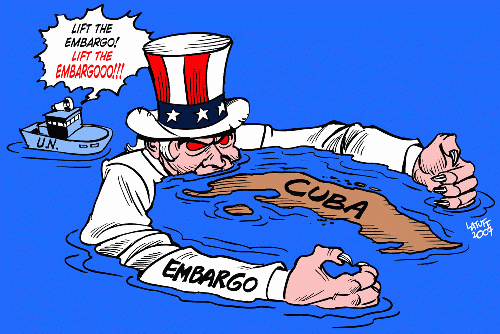All of us are stoked. My wife, Peggy and I and 14 Berea College students are leaving for three weeks in Cuba beginning on Monday (May 5th). We'll return on the 25th. So I probably won't be writing here till then.
Last Wednesday night, Thursday evening, as well as Friday morning and afternoon, Dr. Cliff Durand -- the co-founder of the Center for Global Justice in San Miguel de Allende, Mexico -- helped us all understand what we're getting into. Cliff has been leading delegations to Cuba for the last 25 years. He's an honorary member of the faculty at the University of Havana.
Here are some of the salient ideas he shared:
1. One cannot understand Cuba's revolution without understanding neo-colonialism. Neo-colonialism refers to the dynamics of control whereby "former" colonies continue to be governed by their colonial masters even after "independence." The control remains because the now-liberated colony continues its economic relationships with its "mother country." Of necessity, these relationships foster a dependency similar to that which characterized the original colonial relationship.
2. In other words, former colonies find it impossible to break free from domination by their colonial masters unless they also break free from the capitalist system which of necessity has local governors placing the interests of their international partners ahead of their own citizens. Put otherwise, there is an indissoluble link between revolution, independence, and capitalism's alternative, socialism.
3. Cuba is the first country in the world to engage in a revolution as a neo-colonial state. Although after 1902 it had freed itself from the domination of Spain, it did so only to become an economic appendage of the United States. Dependency and control by the United States was the form neo-colonialism took in Cuba.
4. The Cuban Revolution of 1959, led by a trained lawyer (Fidel Castro) and a medical doctor (Che Guevara) opened the way to a new experiment in human dignity and social justice. The experiment's adoption of socialism promised to free Cuba from the dependency international capitalism uniformly imposed on former colonies.
5. Cuba has proven resilient in the face of a 50 year economic embargo imposed by its former neo-colonial "mother country"--the United States. The economic support of the former Soviet Union made it possible for Cubans to enjoy a "middle class" way of life that made Cuba the envy of the Third World.
6. Though characterized in the U.S. as "subsidies," the Soviet contributions to the Cuban economy were seen in Cuba as "fair trade." Economic relationships indexed the prices of Cuban raw materials (sugar, tobacco, nickel . . .) to those of the finished products (tractors, refrigerators, spare parts . . .). In fact, this represented an implementation of the New International Economic Order (NIEO) petitioned in 1973 by the entire former colonial world in reparation for the exploitation experienced under colonialism. (Nations of the Global South also demanded transfer of capital and technology -- also provided by the USSR to Cuba.)
7. Cuban Democracy: Cuba has a parliamentary system with no political parties, which are seen as divisive. The Communist party is not an electoral organization; it sponsors no candidates. Rather it is the depository of the ideals of the Cuban revolution. In the Cuban form of democracy, elections are held at the municipal, provincial and national levels. At the national level, "Mass Organizations" (five federations of (1) workers, (2) women, (3) small farmers, (4) students, and (5) Committees for the Defense of the Revolution) nominate candidates. (Mass organizations are like 5 political parties sharing commitment to cooperation rather than competition.) All the organizations enjoy equal representation in the Cuban parliament. Forty-seven percent of the delegates there are women. The National Assembly (parliament) elects a Council of State, which then elects a president and vice-president. According to frequent independent polls, well over 80% of the Cuban population supports this system.
8. The Cuban Revolution has passed through five identifiable stages:
o 1960s Revolutionary Fervor: Here the revolutionary government implemented land reform, nationalization of industries and virtually the entire Cuban economy. The U.S. economic embargo (specifically intended to produce hunger, sickness, and social chaos) necessitated alliance with the Soviet Union. During this early period moral incentives worked to unite the people in a common social project. Che and Fidel enjoyed great trust on the part of Cubans.
o 1970s Adoption of Soviet-Style Central Planning: Here Cuba followed the example of the Soviet Union, the most prominent model of socialism available. More specifically, it adopted the agricultural methods of the Green Revolution with its heavy dependence on chemical pesticides and fertilizers. The entire agricultural system was organized into state farms. (This was later admitted to have been a major mistake).
o 1985 Rectification: In the face of excessive bureaucracy and inefficiencies, the entire Cuban population participated in a national dialog to suggest remedies. The process was interrupted by the collapse of the Soviet Union. Overnight Cuba lost 80% of its trading partners. A decade-long period mirroring the experiences of the world's "Great Depression" (1929-'45) set in for Cuba.
(Note: You can view every article as one long page if you sign up as an Advocate Member, or higher).






